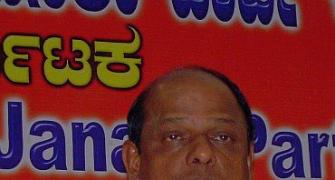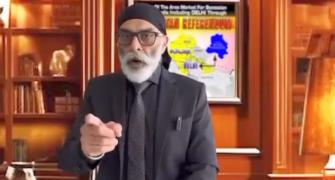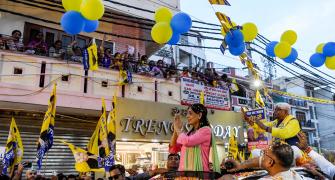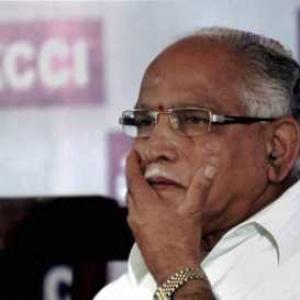It was October 2007 and Rajnath Singh was president of the Bharatiya Janata Party. H D Deve Gowda's Janata Dal Secular with 56 members of Legislative Assembly didn't have the numbers to form a government.
Deve Gowda was forced to do a deal with the devil -- the BJP that had 79 MLAs in a House of 224. The arrangement was that Deve Gowda's son H D Kumaraswamy would rule for two and a half years, and then yield the chief ministership to BJP's B S Yeddyurappa, then the state deputy chief minister.
But, when the time came for Kumaraswamy to hand over the mantle to Yeddyurappa, he changed his mind. Around the same time, one of his ministers, M P Prakash, broke away from the JDS. Karnataka was under the President's rule. Rajnath Singh saw this as an opportunity -- the party could go to town, shouting it had been betrayed by the JDS and sweep the elections.
But Yeddyurappa was having none of that. It was his moment in the sun, after all. He ran to Delhi to beg, plead, cajole -- do anything to let him become chief minister.
Rajnath Singh told him, "Mr Yeddyurappa, you SHALL NOT become chief minister." Yeddyurappa returned to Bangalore and staked claim to become the chief minister of a minority government. That government lasted a week. The President's rule was declared and elections followed in April 2008.
That was the first sign that Yeddyurappa had come into his own -- he was going to be bullied by no one, advised by no one and would continue to be his own man. This man is going to be their nightmare. And, there are several reasons for this.
Yeddyurappa is a Lingayat. Two castes -- the Vokkaliga and the Lingayat -- have been the dominant social groups in Karnataka, since the state was created. The tussle for power between these two communities has been the leitmotif of politics in the state. Karnataka has had five chief ministers from the Vokkaliga community, and six have been Lingayats. Three chief ministers have been from the backward classes, while Brahmins have managed to hold the top spot twice.
The Vokkaligas, who comprise around 15 per cent of the population of Karnataka, are spread mainly across Bangalore, Mandya, Hassan, Mysore, Kolar and Chikamagalur. Lingayats comprise around 17 per cent and are dominant in the central and the northern parts of Karnataka.
The Dalits are around 23 per cent of the population, the Kurubas eight per cent and the Muslims make up 10 per cent. The rest are Christians and others. All these numbers are approximations, but they do indicate the proportions.
The last memorable Lingayat chief minister of Karnataka was Veerendra Patil, when the Congress was in power in the state in the 1980s. Patil, however, suffered a stroke in the saddle and was unable to function for several months. Rajiv Gandhi, the then prime minister, ordered his replacement. Patil died soon thereafter, his community said, of a broken
heart, and the Lingayats promised to avenge the humiliation to the community and their leader. They moved en masse to the BJP.
Between the 1980s and the decade of 2000, a lot changed in the political landscape of Karnataka. The state -- especially the Hubli-Dharwad-Mangalore region -- had always been strongly majoritarian. During L K Advani's rath yatra, one of the largest contingent of karsevaks was from north Karnataka. This is the region to which Yeddyurappa belongs. Unlike the topography of south Karnataka -- the fertile rich alluvial plains of Hassan and Mandya -- north Karnataka is poor, arid, badly irrigated and always on the edge, a communal tinder box. So, this was fertile breeding ground for the growth of the BJP.
Yeddyurappa began his political life as a secretary of the Rashtriya Swayamsevak Sangh in his village, Shikaripura. He was arrested during the Emergency of 1975 and in 1983; he contested and won the Shikaripura Assembly seat, which he has represented five times since then.
He might have been just that -- just another influential BJP MLA -- had a dispute not broken out in the BJP between Anantha Kumar and Dhananjaya Kumar. They were rival upper castes. But, in Yeddyurappa, the entire Lingayat community saw another Veerendra Patil. The BJP could see, through Yeddyurappa, the chances of getting a foothold in a state in the south. Moreover, this was not the just urban centres -- the party saw its rural base growing.
The BJP swept the 2008 Assembly election. Yeddyurappa doled out contracts, offered ministerships and denotified land with a generous hand. The Karnataka Lokayukta finally caught up with him. Yeddyurappa confessed that an illegal iron ore export racket that involved some of his ministers occurred under his watch. But the Lokayukta also charged him with denotifying government land for his sons Raghavendra and Vijayendra. The BJP brass had warned him not to do this. But Yeddyurappa told friends he had no choice: family pressure. He was arrested in October 2011 and sent to jail. He got bail, but the case is on.
Obviously, he could not have continued to be chief minister. He said Sadananda Gowda should be made chief minister. A Vokkaliga, but from a small sub-caste, Yeddyurappa thought Gowda would be biddable because he had no mass base (he had to be elected to the council because no one would vacate their assembly seat for him).
But Gowda proved to be his own man. So, when Yeddyurappa got bail and wanted his old job back, Gowda said he wouldn't move. Yeddyurappa mounted another rebellion. And, the BJP brass gave in. Jagadish Shettar became chief minister, in consultation with Yeddyurappa.
Still dissatisfied, Yeddyurappa said he would leave the BJP. Initially, nobody believed him. In Haveri, on Saturday, Yeddyurappa launched the Karnataka Janata Pakshe, a move that could cause the BJP government in Karnataka to fall because several MLAs are expected to rally behind him.
The Karnataka assembly elections are due in May next year. The BJP has less than five months to straighten things out.







